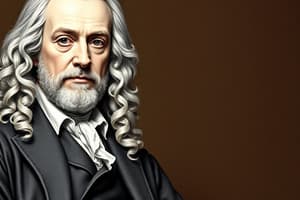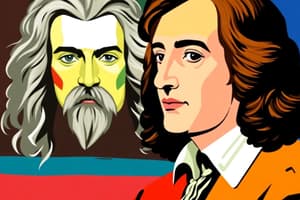Podcast
Questions and Answers
Which philosopher believed in the idea of Natural Rights including life, liberty, and property?
Which philosopher believed in the idea of Natural Rights including life, liberty, and property?
- Montesquieu
- John Locke (correct)
- Voltaire
- Rousseau
Who wrote the 'Two Treatises of Government' and influenced Thomas Jefferson in writing the Declaration of Independence?
Who wrote the 'Two Treatises of Government' and influenced Thomas Jefferson in writing the Declaration of Independence?
- Voltaire
- John Locke (correct)
- Rousseau
- Montesquieu
Which philosopher advocated for the concept of a peaceful government that respects the rights of individuals?
Which philosopher advocated for the concept of a peaceful government that respects the rights of individuals?
- Montesquieu
- Voltaire
- John Locke (correct)
- Rousseau
Who proposed the idea of a social contract where the government gives power to the people but also allows individuals to keep their rights?
Who proposed the idea of a social contract where the government gives power to the people but also allows individuals to keep their rights?
Which philosopher believed in the separation of powers within the government for political liberty?
Which philosopher believed in the separation of powers within the government for political liberty?
Who wrote the book 'Spirit of Laws' and promoted the concept of separation of powers and checks and balances in government?
Who wrote the book 'Spirit of Laws' and promoted the concept of separation of powers and checks and balances in government?
Which philosopher advocated for freedom of speech and expression, and opposed abuse of power?
Which philosopher advocated for freedom of speech and expression, and opposed abuse of power?
What were John Locke's beliefs about Natural Rights?
What were John Locke's beliefs about Natural Rights?
What did Rousseau's social contract emphasize?
What did Rousseau's social contract emphasize?
What was Montesquieu's view on the separation of powers within the government?
What was Montesquieu's view on the separation of powers within the government?
What principles did Voltaire advocate for in government?
What principles did Voltaire advocate for in government?
What did these philosophers feel about absolutism and old feudal governments?
What did these philosophers feel about absolutism and old feudal governments?
What role did the Physiocrats play in relation to government and economics?
What role did the Physiocrats play in relation to government and economics?
Who was known as the father of capitalism and promoted a laissez-faire economy?
Who was known as the father of capitalism and promoted a laissez-faire economy?
What did John Locke believe about individuals' rights that cannot be taken away?
What did John Locke believe about individuals' rights that cannot be taken away?
What did Montesquieu want the government branches to do?
What did Montesquieu want the government branches to do?
What did Voltaire believe about the abuse of power in government?
What did Voltaire believe about the abuse of power in government?
What impact did the increase in technological advancements have on the available space?
What impact did the increase in technological advancements have on the available space?
What was the focus of the Scientific Revolution and how did it affect people's views?
What was the focus of the Scientific Revolution and how did it affect people's views?
What were the key developments in industrialization during this period?
What were the key developments in industrialization during this period?
How did the Agricultural Revolution impact people's daily lives?
How did the Agricultural Revolution impact people's daily lives?
What conditions in Great Britain supported industrialization?
What conditions in Great Britain supported industrialization?
Who were some of the innovators and their contributions to the Industrial Revolution?
Who were some of the innovators and their contributions to the Industrial Revolution?
What was the birth of the cottage industry?
What was the birth of the cottage industry?
How did scientific technology contribute to food production?
How did scientific technology contribute to food production?
What role did the availability of resources play in the Industrial Revolution?
What role did the availability of resources play in the Industrial Revolution?
What influenced the growth of the middle class in Great Britain?
What influenced the growth of the middle class in Great Britain?
How did the nature of government in Great Britain support industrialization?
How did the nature of government in Great Britain support industrialization?
What were the geographical advantages of Great Britain for industrialization?
What were the geographical advantages of Great Britain for industrialization?
What were the key factors that allowed wealthy landowners to invest in better planting methods and technology?
What were the key factors that allowed wealthy landowners to invest in better planting methods and technology?
How did the Protestant work ethic support industrialization in Great Britain?
How did the Protestant work ethic support industrialization in Great Britain?
Flashcards are hidden until you start studying
Study Notes
Philosophers and Government
- John Locke believed in the idea of Natural Rights, including life, liberty, and property, and wrote the 'Two Treatises of Government', influencing Thomas Jefferson in writing the Declaration of Independence.
- He advocated for a peaceful government that respects the rights of individuals and proposed the idea of a social contract where the government gives power to the people but also allows individuals to keep their rights.
- John Locke believed that individuals have certain rights that cannot be taken away, such as life, liberty, and property.
Montesquieu and the Separation of Powers
- Montesquieu wrote the book 'Spirit of Laws' and promoted the concept of separation of powers and checks and balances in government to ensure political liberty.
- He believed that the government branches should balance each other to prevent abuse of power.
Voltaire and Freedom of Speech
- Voltaire advocated for freedom of speech and expression, and opposed abuse of power in government.
Rousseau's Social Contract
- Rousseau's social contract emphasized the idea that the general will of the people should be the foundation of the social contract.
Physiocrats and Laissez-Faire Economy
- The Physiocrats played a significant role in promoting a laissez-faire economy and limiting government intervention.
- Adam Smith, known as the father of capitalism, promoted a laissez-faire economy and was influenced by the Physiocrats.
The Scientific Revolution and Industrialization
- The Scientific Revolution focused on empirical observation and experimentation, leading to a shift from traditional to modern ways of thinking, and ultimately contributing to industrialization.
- The Industrial Revolution was characterized by the development of new machines, factories, and mass production techniques.
- Innovators like James Watt (steam engine) and Richard Arkwright (water frame) made significant contributions to the Industrial Revolution.
Agricultural Revolution and Industrialization
- The Agricultural Revolution, which involved the enclosure movement and new farming techniques, led to an increase in food production and a surplus of labor, contributing to industrialization.
- Conditions in Great Britain, such as the availability of resources and geographical advantages, supported industrialization.
- The growth of the middle class in Great Britain was influenced by industrialization and the Protestant work ethic.
- The nature of government in Great Britain, which was more liberal and supportive of entrepreneurship, also supported industrialization.
Studying That Suits You
Use AI to generate personalized quizzes and flashcards to suit your learning preferences.



